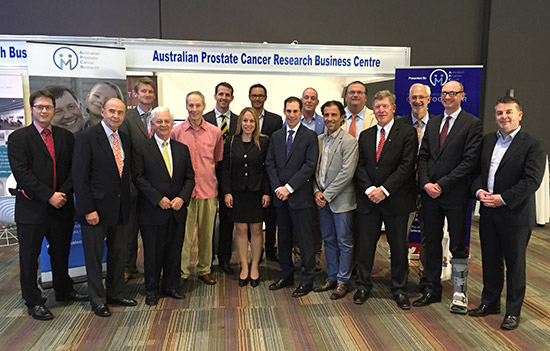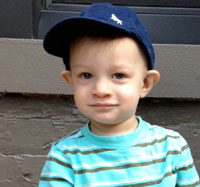Prostate Cancer Immunotherapy Project Receives Grant
Dr. Catalona is part of a research team seeking to develop a breakthrough immunotherapy treatment for prostate cancer. The project is unique because the multidisciplinary team will use advances in the fields of nanotechnology and immuneoncology to design and test the treatment. The Prostate Cancer Foundation has awarded this project a $1 million Challenge Award grant, enabling the work to begin soon. Learn more here.
Intuitive Surgical Facing Lawsuits Alleging Patient Death and Injury with Robotic Surgery
As reported in The Mercury News, Intuitive Surgical is facing numerous product-liability claims and lawsuits over the da Vinci surgical robot: “In its most recent quarterly report, the firm said it is still facing a ‘large number’ of product-liability claims, plus 52 lawsuits alleging its machines were responsible for patient injury or death, and a multiparty suit covering 55 patients who had da Vinci Surgeries in 22 different states. Many complaints concern surgeries done in 2012 and 2013." Read the full article online here.
Understanding Research and Treatment News:
A Virtual Town Meeting for Advanced Prostate Cancer Patients and Their Loved Ones
On April 10, 2016, Dr. Catalona participated in Understanding Research and Treatment News: A Virtual Town Meeting for Advanced Prostate Cancer Patients and Their Loved Ones. The webinar featured leading experts discussing the latest research and treatment information, inspirational patient stories and advice for living well.
This virtual town meeting was sponsored by the Patient Empowerment Network through educational grants from Astellas, Medivation, Inc. and Sanofi. Produced in association with Robert H. Lurie Comprehensive Cancer Center of Northwestern University and Us TOO
Dr. Catalona’s Research: Impacting the Lives of Men with Prostate Cancer
 Contributions to the URF support Dr. Catalona’s groundbreaking research for the early detection, prevention and treatment of prostate cancer.
Contributions to the URF support Dr. Catalona’s groundbreaking research for the early detection, prevention and treatment of prostate cancer.
Learn more about Dr. Catalona’s work in the following areas:
- Tests for the early detection of prostate cancer
- Focusing on genetic variants
- Examining active surveillance
- The relationship between genetic variants and active surveillance
- Improving treatment through personalized medicine
SPORE: Making Strides in Prostate Cancer Research

The National Cancer Institute awarded Dr. Catalona and his colleagues a grant of approximately $11 million over 5 years for the Prostate SPORE (Specialized Program of Research Excellence). Learn more about the award in the Summer/Fall 2015 issue of Quest and the research projects in the Winter 2014 issue of QUEST. SPOREs are an integral part of the National Cancer Institute’s efforts to promote collaborative and interdisciplinary cancer research.
The funding of the SPORE is a cause for celebration. It will enable researchers to conduct studies that impact the outcomes and quality of life of prostate cancer patients.
Prostate Cancer World Congress
Dr. Catalona attended the 2015 Prostate Cancer World Congress in Australia.

WGN News Features PHI Test
The Prostate Health Index (PHI) test is now available at Northwestern Memorial Hospital, offering patients a new option for detecting prostate cancer. In February, WGN News highlighted the PHI test and interviewed Dr. Catalona in a story entitled “New test means new way to fight prostate cancer.”
Alert: New Concerns Revealed about Robotic Surgery
FDA Surveying Hospitals and Surgeons about Robotic Surgery Complications
The FDA is investigating the safety of surgical robots used in many US hospitals for surgery. By surveying surgeons at key hospitals, the government agency seeks to determine if the rise in incidents, including deaths, reported to the FDA result from the robots or from other issues.
Learn more:
- Robot Surgery Damaging Patients Rises with Marketing (Bloomberg, October 7, 2013)
- Robot Hot Among Surgeons but FDA Taking Fresh Look (AP, April 9, 2013)
- Robosurgery Suits Detail Injuries as Death Reports Rise (Bloomberg, March 5, 2013)
- Intuitive Robot Probe Threatens Trend-Setting Surgeries (Bloomberg, March 1, 2013)
Growing Concerns About Surgical Robots
A CNBC Investigations, Inc. review reveals a rise in lawsuits and complaints about injuries after da Vinci surgical robot procedures.
Learn more:
- Robot Doctors in the Operating Room (ABC News, April 12, 2013)
- Robotic Surgery: Growing Sales, but Growing Concerns (CNBC, March 19, 2013)
- Intuitive Surgical: Angel with Broken Wings, or the Devil in Disguise? (Citron Research, January 17, 2013)
- Has the Halo been Broken on Intuitive Surgical? (Citron Research, December 19, 2012)
Relevant QUEST Articles:
Cancer Detection Tool Saves Lives
The Large Urology Group Practice Association (LUGPA) released its prostate cancer screening guidelines in response to the recent PSA controversy, saying that data clearly demonstrates that are detecting prostate cancer earlier and thus saving lives.
The LUGPA’s position on PSA screening is:
- Risks of prostate cancer screening must be uncoupled from risks of prostate cancer detection and treatment
- PSA testing facilitates the early detection of prostate cancer, which results in a reduced risk of being diagnosed with or developing locally advanced and/or metastatic prostate cancer, and a reduction in prostate cancer-specific mortality
- A baseline PSA level should be obtained in men in their 40s who have made an informed decision to pursue early detection of prostate cancer
- Intervals for an individual’s prostate cancer screening should be adapted to: baseline PSA, prostate cancer risk factors (including African-American heritage and a family history of prostate cancer), and the potentially short preclinical timeline of aggressive cancers
- PSA screening should be offered to men with a life expectancy of greater than or equal to 10 years, regardless of age
- PSA testing should not be considered on its own, but rather as part of a multivariable approach to early prostate cancer detection
LUGPA is an organization advocating for integrated and coordinated urological care with more than 2,000 physician experts across the U.S. The association represents 121 large urology group practices in the United States, with more than 2,000 physicians who make up more than 20% of the nation’s practicing urologists.
International Prostate Cancer Research Group Receives Funding
The International Consortium for Prostate Cancer Genetics (ICPCG) received a grant for its important genetic research. Specifically, the ICPCG whole exome sequence project will receive funding. The results of this project could be incorporated in Dr. Catalona’s SPORE (Specialized Program of Research Excellence) proposal to discover genetic variants associated with the aggressive types of prostate cancer that lead to the failure of active surveillance.
The ICPCG is a collaborative group conducting research on familial prostate cancer. The researchers in this group share a common interest in genetic susceptibility for prostate cancer. Dr. Catalona is a principal investigator of the Northwestern University site of the ICPCG.
Learn more about the ICPCG here.
Responding to USPSTF Recommendation

This section includes articles to help you understand the disturbing ramifications of the recent USPSTF recommendation on PSA testing, the misinterpretation of studies, and what can be done to ensure men have a choice in taking the test. We also provide information on contacting your government representatives.
Participate in Research Studies

Northwestern Memorial Hospital and Dr. William Catalona offer opportunities for you to participate in research projects on the treatment and prevention of prostate cancer.

